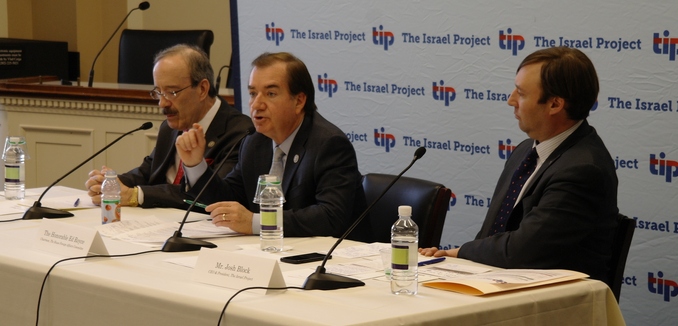The top two congressmen on the House Foreign Affairs Committee held a joint event on Wednesday, a few weeks after the one-year anniversary of the implementation of the Iran nuclear deal, to highlight the dangerous implications of Iran’s destabilizing behavior and emphasize the importance of pressuring it to abide by the terms of the deal.
Reps. Ed Royce (R – Calif.) and Eliot Engel (D – N.Y.), respectively the chairman and ranking member of the committee, were introduced by Josh Block, CEO and president of The Israel Project (which publishes The Tower). Block observed that while the deal was opposed by a majority of Americans and their representatives in Congress at the time it was implemented, now that it is in place, “we need to do our duty and ensure that it is implemented as effectively and aggressively as possible.” As the new session of Congress begins, the objective remains “to contain Iran’s aggressive behavior and prevent it from becoming a nuclear power,” he added. The United States and its allies “must use every tool at our disposal to prevent Iran’s nuclearization and its continued [attempts] to extend its hegemony.”
Royce recalled that he and Engel cosponsored a bill that Congress overwhelmingly passed in 2013 that would have “put the kind of sanctions on Iran that would give us the leverage to get to where we could have a decision made on Iran giving up its nuclear program, not temporarily as this agreement does, but permanently.” It also would have “[forced] a decision on the Ayatollah to either give up his nuclear program or face an economic collapse of the system,” Royce noted. However, the legislation did not advance due to lack of support in the Senate.
Increasing sanctions on Iran would have been preferable to the path pursued by the Obama administration, which eroded American leverage, Royce charged.
What you’ll notice is Iran using this leverage to get the secretary of state to make a tour, you know, around Europe, around Asia, saying ‘Iran is open for business.’ Well that’s because he’s under pressure. We have a situation, now, when our state department officials go so far as to say Iranian economic growth is in our national security interests.
As a result, Iran could say “transfer us cash and gold” and watch the U.S. comply, Royce observed.
“What struck me the most” about the deal, Royce recalled, is that the Obama administration always insisted that Iran would continue being subject to a ballistic missile ban. “Imagine my surprise,” he said, “when we see, on the side of … a new ballistic missile that they tested, the words [in Farsi], ‘Israel must be destroyed.'” In case there was any doubt about the message, it was printed in Hebrew on the other side, Royce observed.
Royce said that the approach he and Engel favored included applying greater pressure on the regime and reaching out to those two-thirds of Iranians who told Gallup that they favor a Western-style democracy.
Engel echoed Royce’s position, noting that while he did not support the nuclear deal, scrapping it is no longer feasible as Iran has already reaped all the benefits it afforded. Now, the priority must be to “hold Iran’s feet to the fire,” he said.
Engel observed that Iran has continued its destabilizing behavior in the wake of the deal, remarking that on a recent visit to Israel’s border with Lebanon, it was “too easy” see the yellow flags of Iran’s proxy group Hezbollah, which has tens of thousands of rockets aimed at Israel. He noted that among Israeli leaders, the question of Hezbollah launching another conflict was not “if” but “when.”
He also expressed his appreciation that the Trump administration is pursuing the issue of Iran’s recent ballistic missile launches at the United Nations, saying, “Iran needs to suffer consequences for their dangerous behavior.”
Calling Iran “the most dangerous player in the region,” Engel warned that “they are going to keep testing us, and they are going to see, like children, what they can get away with.” So it will be necessary to “slam the door” and “have them understand that we’re not going to put up with their nonsense,” he emphasized.
In responding to recently announced ballistic missile tests by Iran, Royce noted that the Iran Sanctions Act was extended last December, allowing the U.S. to warn Iran that any future ballistic missile tests would result in American banks being barred from conducting dollar transactions with their Iranian counterparts. The U.S. could also warn European and Asian businesses to blacklist companies affiliated with Iran’s Islamic Revolutionary Guard Corps, which is behind Iran’s ballistic missile program.
Engel called on the U.S. to present a united front with Israel and Arab Sunni states, who view Iran as the major threat, in order to signal the emergence of a coalition opposing Iranian aggression.
Royce later said the U.S. should broadcast messages supportive of democracy and civil liberties to Iranians, particularly by highlighting the tolerance of similar values during earlier periods in Persian history. He said that such a campaign would mimic the operations of Radio Free Europe during the Cold War, and could possibly bring opposition to the clerical regime to 85 percent, which could be a “tipping point.”
[Photo: The Israel Project ]




